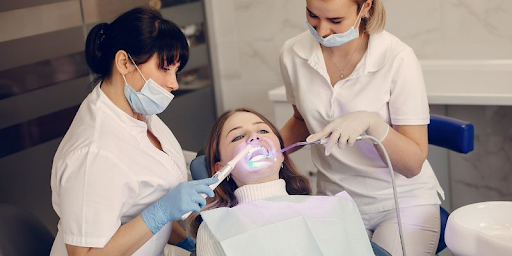Tips to Maintain Oral Health and Prevent Dental Emergencies
Dental emergencies are often painful, expensive, and inconvenient. However, many of these emergencies can be avoided with proper attention and care to your oral hygiene. By adopting healthy oral hygiene habits and making some lifestyle changes, you can reduce your risk of dental emergencies. This article will explore strategies to help you keep a healthy mouth and prevent those unexpected dental visits.
1. Regular Brushing and Flossing
Regular brushing and flossing are the foundation of good oral hygiene. Brushing at least twice daily helps remove plaque, food particles, and other harmful substances that can lead to gum disease and tooth decay. Use a fluoride-containing toothpaste and a toothbrush with soft bristles to brush all surfaces of your teeth. Don’t forget to clean your tongue, as it can harbor bacteria.
Importance of Flossing
Flossing daily is also important, as it removes plaque and debris that can accumulate between your teeth and below the gumline, where your toothbrush can’t reach. By preventing plaque and tartar buildup, you can reduce your risk of developing cavities, gum disease, and other oral health issues.
2. Regular Dental Check-ups
Routine dental check-ups are essential for maintaining good oral health and preventing emergencies. Dentists can identify potential problems before they become serious, such as cavities, gum disease, or early signs of oral cancer. Professional cleanings can remove tartar that is difficult to eliminate with regular brushing and flossing.
Benefits of Bi-Annual Visits
By visiting your dentist every six months, you can detect and treat any problems early on, reducing the chance of them becoming more serious. It’s also an opportunity to receive advice on maintaining your oral hygiene.
3. Be Careful What You Eat and Drink
Your diet plays an important role in your oral health. Sugary and acidic foods and drinks can erode tooth enamel, leading to cavities and sensitivity. Limit sweets, acidic fruits, and sodas. If you consume them, rinse your mouth with water afterward to neutralize the acids.
Healthy Diet Tips
Instead, focus on a healthy diet rich in vitamins and minerals. Calcium, found in dairy products, leafy greens, and almonds, helps strengthen your teeth. Vitamin D, obtained from sunlight and foods like fatty fish and fortified products, aids in calcium absorption. Crunchy fruits and vegetables like apples and carrots can also help clean your teeth as you chew, acting as natural toothbrushes.
4. Protect Your Teeth During Physical Activities
If you participate in sports or activities that could injure your mouth, wearing a mouthguard is essential. Mouthguards protect your teeth and gums from impact, preventing injuries like chipped or knocked-out teeth. Custom-made mouthguards from your dentist offer the best protection, but even over-the-counter options can provide a good level of safety.
Avoid Using Teeth as Tools
Additionally, avoid using your teeth to hold objects. Opening packages, biting nails, or using your teeth to hold items can cause cracks or chips that may lead to a dental emergency.
5. Address Problems Early
If you notice any signs of dental issues, such as tooth sensitivity, bleeding gums, or persistent bad breath, don’t ignore them. These symptoms could indicate early stages of gum disease, cavities, or other conditions that could turn into emergencies if left untreated. Seek professional help promptly to address these problems before they worsen.
6. Avoid Tobacco Products
Smoking and using other tobacco products significantly increase the risk of gum disease, tooth decay, and oral cancer. Tobacco reduces blood flow to the gums, hindering the body’s ability to fight infections and heal. Quitting tobacco not only improves your overall health but also greatly reduces the likelihood of dental emergencies.
7. Stay Hydrated
Drinking water throughout the day is vital for maintaining oral health. Water helps wash away food particles and bacteria that can lead to plaque buildup. It also promotes saliva production, which naturally cleanses the mouth and neutralizes harmful acids. Staying hydrated is particularly important if you suffer from dry mouth, which can increase the risk of cavities and gum disease.
8. Manage Stress
Stress can affect your oral health in unexpected ways. Many people grind their teeth or clench their jaws when stressed, leading to problems like tooth fractures, jaw pain, and TMJ disorders. Practice stress management techniques such as deep breathing, exercise, or meditation to reduce these habits and protect your teeth from damage.
Conclusion
Preventing dental emergencies is within your control through proper oral care and healthy lifestyle choices. By brushing and flossing regularly, attending routine dental check-ups, eating a healthy diet, and protecting your teeth during physical activities, you can keep your mouth healthy and reduce the risk of painful and costly dental emergencies. A little prevention goes a long way in ensuring a healthy smile for years to come.
About Author
This post was written by a professional at Elite Dental and Orthodontics. Your partner for dental implants in El Segundo CA, Elite Dental’s mission is to provide exceptional dental care that brings smiles to life. Whether you’re seeking relief from tooth pain, considering a veneer smile makeover, or require a dental implant, our experienced team is here to guide you on your journey to optimal oral health in Los Angeles, CA.
Share this content:














Post Comment